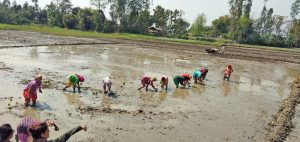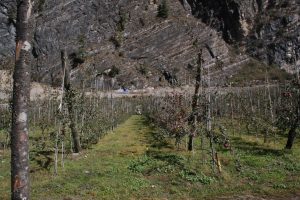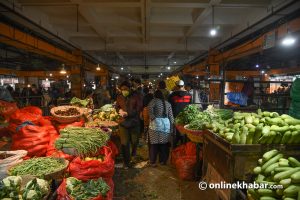
The global outbreak of Covid-19 and the prolonged lockdown imposed to combat the spread of this virus has not left any section of the population and any sector of the economy unaffected. Therefore, the affected also include farmers too; they were hit by transportation suspension, market closure, falling prices of agriculture, and the shortage of workforce. On the positive side, terrace farming and some smaller activities have got more popular during the lockdown.
To discuss these issues, Onlinekhabar recently talked to Govinda Sharma, who has been active nationally and internationally promoting permaculture, a “practical way to design your space, farm, or lifestyle in such a way that it is benign to nature and society”, in Nepal and abroad as the founder and chairperson of Hasera Agriculture Research and Training Centre in Kavre. Sharma used to be busy hosting different groups of foreigners and Nepalis at his farm for training on permaculture and other innovative agricultural practices, but the activities have come to a halt these days. However, he also seems hopeful about the long-term impacts of the pandemic on agriculture.
Excerpts:
How do you assess the impact of this crisis on Nepali agriculture in general and permaculture in particular?
It is evident that around 80 per cent of the farmers in Nepal have been unable to send their perishable products to the market and are losing their only income source. Many have not been able to buy seed, fertilisers and other required inputs on time; it could stop the farmers from having expected yields and income even in the coming season.
Even at this situation, Indian agricultural products are being imported and sold freely in every town; the self-esteem of Nepali farmers have gone down. This act of the government has made people afraid to engage themselves in agriculture in the future. That is why I fear loan facilities and personal investments in agriculture will be reduced on the days to come.
Also, big agriculture farms faced labour crisis during the shutdown as the workers left their jobs. Unlike many other industries or business, the labour shortage in agriculture can immediately result in an emergency because one cannot stop feeding or milking cows for not having workers to do this.
As far as permaculture is concerned, I feel the market for permaculture is located much farther than agriculture in general. Permaculture farms are facing more problems than anything else.
How is that? What are particular problems and challenges troubling the permaculture farms?
Before talking about the challenges, let me mention one basic truth of permaculture farms. They have to invest a lot for the restoration of nature and social systems. It costs a lot of labour. Most of the permaculture farms were managing these labour requirements with international volunteers. As such volunteers cannot come now amid transportation shutdown, these farms are in big trouble of managing the labour requirements.
Permaculture farms prefer to use local and traditional seeds, and such seeds are not available everywhere. There is an undefined but strong system of seed exchange among the farms. Due to the lockdown, these seed exchange systems have broken down. So, many farms are facing seed scarcity now.
As consumers of permaculture farms are located away, the selling of products from these farms has become a big challenge, resulting in the fall of income.
But, many people think that the lockdown has done something good for agriculture. The practice of terrace farming and home vegetable gardening increased massively during the lockdown; some hope it could lead to a revolution.
Yes, I believe the pandemic has well exhibited the necessity of improving our own agricultural systems. Urban agricultural practices getting momentum is a result of that.
However, it is also a harsh reality that urban agriculture contributes hardly one per cent of our total agricultural needs. The rest has to come from normal land-based systems.
Have this crisis and resultant lockdown also boosted the importance of permaculture in particular among the general people just like agriculture in general?
Yes, during the initial days of the lockdown, it was like that. But, as people saw that the government is not supportive, they could not really move their steps towards agriculture and permaculture as they wished. For example, the government could not manage vehicles to collect fresh farm products from the villages. Meanwhile, the supplies of products from India were not disturbed.
Also, roadside vendors and consumers of farm products were harassed by the police, but some of the supermarkets which mostly sell imported products were permitted to open. All of these gestures from the government made enthusiastic permaculture practitioners highly frustrated.
On the positive side, some small-scale permaculture initiatives have increased a lot. Because people felt the need of it and also they are free at home, they have more time to work in gardens. Also, people have now realised that the market-based food supply systems can collapse at any time.

So now, what should the government do to address problems in the sector and turn them into opportunities?
The government and its units could have played a vital role in promoting people’s inclination people towards agricultural activities by facilitating and channelising their sentiments. However, it is crystal clear that our government has failed to do so. This has already calmed down the need felt by the general public to promote agriculture.
However, there are some exceptions. For example, Tilottama municipality has executed practical rules to cultivate fallow lands. Others should learn from them.
Otherwise, the Nepali agriculture sector will lose a big opportunity, and, again, Indian farm products are increasing their business in Nepal.
As per your understanding, what are the opportunities that Nepali people can look forward to in permaculture?
By now, people have realised that the market-based food supply systems are not secured. They can break down anytime. This has made people acknowledge that they should produce as much as possible on their own. Many people are now in homes so they have more time to spend in the garden.
Likewise, this crisis has given people an opportunity to understand the importance of gardening meditation, exercise through gardening, garden as a good tool for family times and many more. Such people who are able to understand this will be a very strong cadre of permaculture and they will help boost it up more. At the same time, the government and non-governmental sectors should encourage them and provide necessary supports.
Permaculture is a very productive, self-reliant and resilient system. Covid-19 and the consequent lockdown have taught us to be more focused on risk management strategies in our permaculture designs.


























